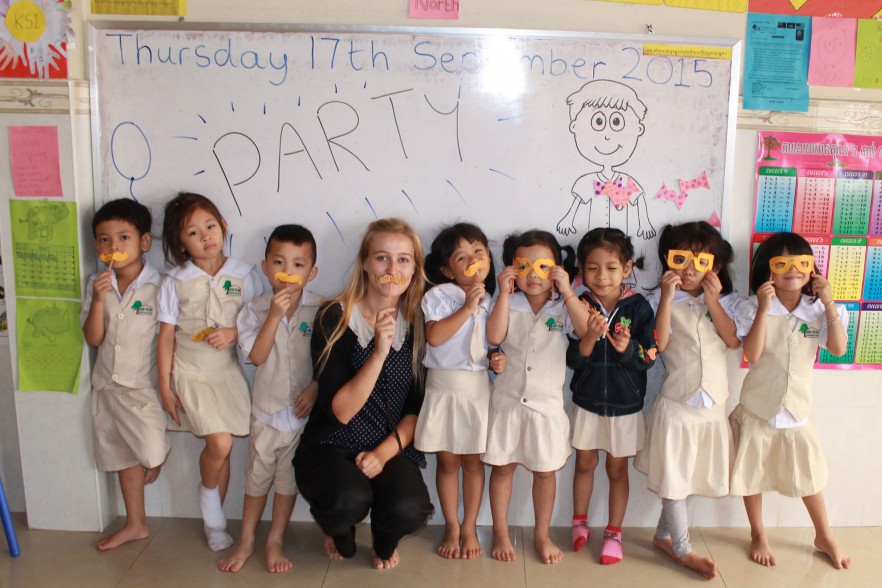You’ve done it! Your TEFL lesson has gone brilliantly. Your lesson warmer was perfect. Those activities you set out in your lesson plan to get your students speaking worked wonderfully. There’s a fantastically positive energy in the room.
And then…
Your eyes hit the clock. Oh no! You’ve ended too early. And now you have an unexpected five (or possibly even ten) minutes before the bell rings.
What should you do?
Don’t panic. Here are our top five tips for filling in those extra minutes at the end of a class.
1. Recap
However well (or not!) your TEFL lesson has gone, it’s always useful to recap on what you’ve covered.
To give this activity an extra spin, ask the class to vote on the part of the lesson they enjoyed the best and (if you’re feeling brave!) the least. Invite a few students to give their reasons – and see if anyone changes their mind.
If you’ve still got time, tell the students to come up with ideas for future lessons. Note their suggestions down on the board, then ask the class to agree on their top three points.
It will help students to reflect on what they’ve learnt, keeps the class talking in English – and it’s all great information to help you plan your next lesson.
Those five minutes will fly by.
2. Pictionary
Whatever the level of your TEFL class, all students need to learn vocabulary. A great tip is to add a few vocabulary cards to your teaching materials, ready to whip out in times of need.
And now is a perfect time to put those cards to use.
Give one student a card with a vocabulary word on it. Ask him/her to start drawing an image of the word on the board. Tell the rest of the class to try to work out what the word is. Depending on the group, you can either ask students to shout out ideas or to put up their hands if they think they know the word.
Students get loads of vocabulary practice as they come up all sorts of different ideas for the word. And everyone has fun. A great way to top off a good (or even not so good) lesson.
Oh – and if you’ve forgotten your vocabulary cards, just pick a suitable word and do the drawing yourself. After all, everyone loves to see a teacher’s bad art!!
3. Hangman
Another way to add a dash of excitement to vocabulary practice is a quick game of hangman.
Choose a word you’ve been studying. Draw a line on the board for each of the letters in the word. Now ask students to pick letters.
If the letter is part of the word then write it into the correct space on the board. If not, add a part to your hangman. The class wins if they guess the word before the hangman is complete.
If you have time students can take it in turns to come to the board and select words for the rest of the class to guess (another occasion when those vocabulary cards will come in handy!).
4. Would you rather?
“Would you rather” is a great game for filling in a few extra minutes. It gets the class interacting and helps you find out more about your students. And an extra bonus we’ve found when teaching abroad is that the answers you get in different countries can be unexpected!
To play this game, ask a question with two options in it – e.g. “Would you rather have a cat or a dog?”, “Would you rather read a book or listen to music?”, “Would you rather climb a mountain or lie on a beach?”, “Would you rather go everywhere by car or never go in a car again?”
Students then need to choose which option they prefer. Depending on space, you can either ask students to move to different parts of the room or to put up their hands to show their preferences. If you have time, ask a few students to explain their choice, before moving onto the next question.
This game works with all levels as you can select questions to fit the class. You can even throw in some questions to help you plan your future lessons (e.g. “Would you rather work individually or in small groups?”).
5. Let the class go early
To be honest, if your lesson has gone that well, you could simply let your class go early. But if you want to pretend you planned it all along, make the act of leaving into a competition.
Divide the class up into small groups and give them a challenge. This could be anything from writing down three things they have learnt today, to identifying something blue (or red or yellow) in the classroom or simply using the correct English to ask if they can leave.
As soon as a team successfully completes the challenge, they get to go. Just make sure you give some extra positive feedback to that final group too!
Your students will leave filled with the buzz of a great lesson PLUS the unexpected bonus of early freedom. And you get an extra few moments to prepare for your next lesson (or plan your next exciting travel adventure).
Now how’s that for a win / win situation?





